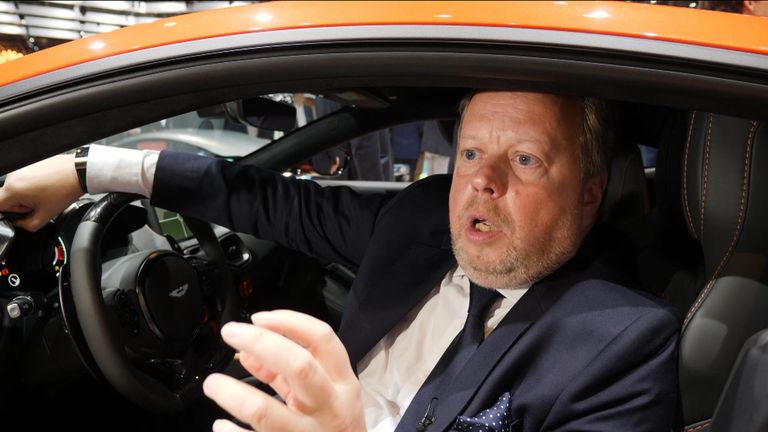Uncertainty on an industrial scale facing carmakers
Peter Schwarzenbauer may not be a familiar name to many in British business, but he was the man that I really wanted to interview in Geneva.
Mr Schwarzenbauer sits on the main board of BMW, in charge of a portfolio of products – the motorbike division but also, crucially, both Rolls-Royce and Mini cars.
Which means that nobody at the top of this company knows more about the impact of Brexit than him.
And when we spoke, he was blunt.
What, I asked, would be the effect of a no-deal Brexit on the future of Mini’s Cowley plant in Oxfordshire?
“This would really be a huge burden to the Mini brand. If this would come – the worst case scenario… we would need to consider what it exactly means for us on the long run.
“For Mini this is really a danger. No doubt about that.”
:: OECD warns no-deal Brexit could plunge UK into recession
So, I asked, would he consider pulling production of Mini away from Cowley?
“We at least have to consider it,” came the reply.
Seven words that throw doubt over the future of a famous plant, 4,500 jobs in the factory, and thousands more jobs that depend upon proving parts and services.
Plenty will accuse him, and other car bosses, of scaremongering, of making empty threats of closures in order to ply pressure on politicians.
I put that point to Mr Schwarzenbauer, as well as a variety of other car bosses in Geneva. Each adamantly denied it.
:: BMW may shift Mini and engine work from UK in no-deal Brexit
Andy Palmer, chief executive of Aston Martin, claimed that a no-deal Brexit could imperil Britain’s entire industry of high-volume car manufacturers.
“It’s not scaremongering, and it’s not Project Fear,” he told me. “It’s reality. It’s about economics.”
Another boss, whose company employs thousands in the UK, said he was dedicated to his British workers but would monitor the effects of new tariffs, delays and costs.
“We are not a charity,” he said, with a wry, knowing smile.
For those workers in Cowley, hearing this threat coming from a German businessman talking in Geneva, this must feel painful.
For others, it resonates with one of the themes that may have lain behind the Brexit result – a fear that British industry relies too heavily on decisions made in other countries.
The UK car industry is, overwhelmingly, a result of foreign investment.
Cars have had a busy Brexit.
While other sectors of our economy have bided their time, the carmakers have been on the front foot from day one.
Depending on your perspective, they’ve either been a bunch of scaremongering remoaners, or else the pragmatic voice of how Brexit could change the British economy.
Whichever way you go, the carmaking voice is hard to ignore.
Why? Well for a start car companies employ a lot of people in the UK – around 186,000 directly employed in making cars, with another 800,000 working in the supply chain.
So that’s about a million jobs tied to cars.
:: Nissan could cut back production line shifts threatening jobs, Sky sources
For another thing – car production is a classic example of an integrated industry where products and components cross borders repeatedly, and arrive at factories at just the right time to be placed on to the production line.
It’s hard to think of a better example of the “just in time” principle that applies to many of our big manufacturing industries, and which carmakers insist would be undermined if the UK were to leave the European Union without a deal.
It’s hard to make a case against that.
Gerard Lyons, co-founder of Economists for Brexit, admitted to me recently that a no-deal Brexit would be “very painful” for three sectors that are dependent on frictionless trade – cars, farming and pharmaceuticals.
“Any impact would be temporary, and the further ahead you look, the better it will be,” he insists, “but in the near term it would create some very big challenges for those industries.”
Uncertainty, of course, is the dread fear of many big businesses.
And when you have three weeks to go and no deal, that is uncertainty on an industrial level.
Source: Read Full Article



